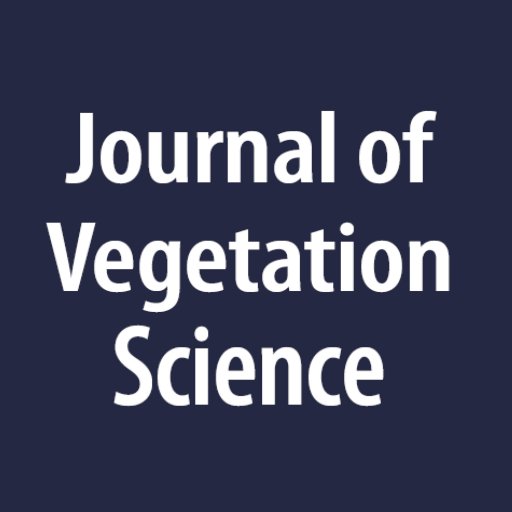
Journal of Vegetation Science
@JVegSci
Followers
882
Following
35
Media
30
Statuses
257
Scientific journal on plant community ecology and vegetation macroecology. Published by the Internation. Assoc. of Vegetation Science: society-run, non-profit
Joined August 2016
‼️ Call for papers! We’re inviting submissions to our Special Feature on “Scaling laws in (vegetation) ecology.” 1️⃣ First deadline for abstract submission: 30 Nov 2025 2️⃣ Second deadline: Spring 2026 3️⃣ Final deadline: Summer 2026 🔗
0
2
1
If you don't want to miss a post from us you can also follow us on #bluesky 🔗 https://t.co/OSWm1ZTCma
0
1
0
We're excited to announce that we'll also be active on Facebook now. Feel free to give us a 👍there! 🔗 https://t.co/ekJSEZHJPY
0
0
1
‼️ Call for papers! We’re inviting submissions to our Special Feature on “Scaling laws in (vegetation) ecology.” 1️⃣ First deadline for abstract submission: 30 Nov 2025 2️⃣ Second deadline: Spring 2026 3️⃣ Final deadline: Summer 2026 🔗
0
2
1
The presence of alternative tree species in European beech forests drives change in functional diversity and composition of forest floor plant communities. A new paper by Bärmann et al. https://t.co/LfZq04g0rl
onlinelibrary.wiley.com
Admixing alternative tree species in European beech forests is associated with changes in the functional diversity and composition of forest floor vegetation. Higher functional richness and diverge...
0
0
4
A new paper by Jo et al. explores multi-species invasions and their impacts on functional plant composition. Special Issue on Biological invasions in Plant Communities.
onlinelibrary.wiley.com
We examine how multi-species plant invasions shape temperate grassland function in New Zealand. Non-native species richness is positively associated with the most abundant non-native species cover,...
0
0
0
Plain language summary of the paper "A comparative study of lichen and bryophyte communities on sandstone and ultramafic bedrocks along a maritime gradient in central California" published in the @JVegSci
https://t.co/PIaoia9SQJ
@IAVS5
vegsciblog.org
Prepared by Michael Mulroy and Nishanta Rajakaruna Lichens and bryophytes may be small, but they are among the dominant life
0
3
4
A new paper by Chen et al proposes a one-dimensional aggregation index (quadrat nearest neighboring distance) for detecting & comparing species spatial distribution patterns. https://t.co/kXbBt6XJko
onlinelibrary.wiley.com
The correlation between one-dimensional quadrat nearest neighboring distance (QNN) and Clark and Evans’ R metric for measuring two-dimensional distributional patterns of the 188 tree species in...
0
0
0
Interannual variability & directional changes affect species composition dynamics but are challenging to quantify. Can yearly-resolved vegetation plot time series give us a better understanding? A new paper by Sabatini et al. https://t.co/mtwrFdeYeB
onlinelibrary.wiley.com
Change in species composition over time is the result of both interannual variability and directional change, but their relative importance can be clouded by pseudoturnover. We developed a matrix...
0
1
1
The presence of alternative tree species in European beech forests drives change in functional diversity and composition of forest floor plant communities. A new paper by Bärmann et al. https://t.co/LfZq04gygT
onlinelibrary.wiley.com
Admixing alternative tree species in European beech forests is associated with changes in the functional diversity and composition of forest floor vegetation. Higher functional richness and diverge...
0
0
0
Drivers of plant species diversity along elevational gradients on seven mountainous islands in the subtropics. - A new contribution to our Special Issue on Island Plant Communities by Vetaas et al. https://t.co/QQq6attQnM
onlinelibrary.wiley.com
Aims Geographic variation in species richness along elevational and latitudinal gradients may be controlled by energy, water, and productivity; however, spatial factors such as area and geometric...
0
0
3
The understory shrub Juniperus oxycedrus influences woody seedling occurrence in relict Cedrus libani forests in Lebanon. A new contribution by Maamary et al. https://t.co/PrAa1ByHGn
onlinelibrary.wiley.com
Comparative view of three Cedar reserves in Lebanon.
0
0
1
Lianas form an important component of tropical forests. Check out a new paper by Addo-Fordjourto to learn how topography and logging affect their community structure. https://t.co/qCDvQQllBK
onlinelibrary.wiley.com
The study reveals how topography and logging influence liana community assemblages in an upland evergreen forest in Ghana. We demonstrate that topographic position influenced liana composition,...
0
0
0
Do small forest gaps collect snow that prevents tree gap dynamics in Western North American high latitude conifer forests? Read more in a new paper by Johnson et al. https://t.co/pr0SqJ0i0r
onlinelibrary.wiley.com
Picture of snow in mid March in a 41-year-old 1.2 diameter gap/tree height. This is a result of low net radiation at latitudes greater than ~40° North leading to deep snow accumulation and melt into...
0
2
0
High root biomass and variation in root functional traits allow non-native grass species to invade tropical open savannahs in Brazil 🇧🇷. A new contribution by Stradic et al. in the Special Issue on Biological Invasions in Plant Communities. https://t.co/kzxlxQjumD
0
1
0
Tropical vegetation: What environmental variables determine the small-scale distribution of tree species in a Sri Lankan Dipterocarp forest? Does their influence vary depending on the life stage of the species? Check out a new paper by Shanika et al. https://t.co/Y1dwQq7UVj
onlinelibrary.wiley.com
We investigated spatial distributions of 57 tree species across life stages in a tropical rainforest, Southwest Sri Lanka, to understand how environmental factors and dependencies vary among species...
0
0
2
Transiently richer but profoundly changed: fire regime triggers physiognomic changes in sub-Mediterranean vegetation in central Italy. Check out a new contribution by Caucci et al: https://t.co/n7fn656oFL
onlinelibrary.wiley.com
In sub-Mediterranean regions, frequent and severe fires phase out highly diverse mixed thermophilous forests and shrubland dominated by both deciduous and evergreen woody species. These communities...
0
0
0
Do evergreen 🌲or deciduous 🌳trees (“phorophytes”) host a greater diversity of epiphytes? Victoriano-Romero & Figueroa-Castro compiled the first study to compare phorophyte-epiphyte networks between different leaf 🍂phenologies. https://t.co/GCyD9LafAj
onlinelibrary.wiley.com
Phorophytes with contrasting leaf phenology offer different microenvironments to vascular epiphytes. Evergreen phorophytes hosted a greater diversity (1D, 2D), as well as greater networks than...
0
0
2
Community-level stability includes temporal and spatial dimensions, but most studies focus only on the temporal dimension. Bai et al. shows why the two dimensions need to be studied independently and how nitrogen affects them. https://t.co/Y1CUFZOQYS
onlinelibrary.wiley.com
This study investigates how nitrogen addition affects temporal and spatial stability of community biomass in alpine meadows. Using 5 years of experimental data, it highlights the key roles of...
0
1
0
How do fire and flooding influence plant diversity in 🌳🌳🌳tree communities along a 🌊📉flood gradient with varying 🔥fire histories? To find out more, read the new paper by de Almeida Souza et al.
onlinelibrary.wiley.com
We analyzed how flood and fire gradients shape tree communities in the Brazilian Pantanal. Functional diversity increased with flooding, while recent fires reduced species richness and functional...
0
1
1












